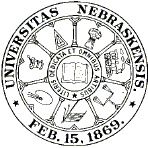
University Studies (University of Nebraska) (1888–1984)
Date of this Version
8-1957
Citation
University of Nebraska Studies: New Series no. 18
Abstract
Though Robert MeAlmon has never received critical or popular acclaim, he deserves attention. An important expatriate in Paris in the Twenties, he was a writer, a publisher and a friend of the great and near-great who lived and worked there. He drank, talked, quarrelled with all of them; and we can understand them better for knowledge of him. McAlmon wrote a great deal, two short novels, four volumes of stories, four volumes of poems and a long autobiography. If these books do not earn him a place among the foremost novelists and poets of his time, they ought not be forgotten. His own publishing house, the Contact Publishing Company, brought out seven of his volumes; and it also brought out books by English and American exiles who became more famous than he. He published important work by Ernest Hemingway, Gertrude Stein, H. D., William Carlos Williams, Marsden Hartley, Robert M. Coates, Ezra Pound and others. Because of his activities as a publisher, as a writer and as a member of the Paris circle, he should be included in accounts of the literary activities of the Twenties.
MeAlmon and the books he wrote and published are part of what Gertrude Stein called the "lost generation." He belonged, as Malcolm Cowley says, "to a period of confused transition from values already fixed to values that had to be created."l Other expatriates in Europe at that time did not remain "lost." Ernest Hemingway became a bestseller; F. Scott Fitzgerald has been turned into the official chronicler of his time; E. E. Cummings lectures at Harvard; Samuel Putnam translates Cervantes and Rabelais to great acclaim; Malcolm Cowley is a prominent critic and man of letters. The wanderings of many of the exiles ended. But McAlmon's search for certainty continued. He traveled over much of Europe and America, hunting for an escape from ennui, taking what pleasures came his way. All his life he lived with judgments suspended. Unable to embrace the religiosity of Eliot, the socialism of the early Dos Passos, the mysticism of the later Huxley, unsatisfied in Paris, Istambul, Mexico, he was constantly on the move; he was at home no place.
Like Thomas Wolfe, MCAlmon found that he could not go home again. Putting down no roots, he continually harked back to his native prairies. Because he wrote of his memories of Dakota, Ford Madox Ford could say that he "represents-though geography is not our strongest point-that West-Middle-West-by-West of which we have been taught to and do expect so much."2 Later he wrote of other countries, and new experiences, of Egypt and Turkey, of Berlin, and of Mexico. But always, whatever his subject matter, there remained something of the wide-eyed preacher's kid in his stories, even in those which dealt with the most abandoned lives of a disturbed postwar era. In almost all of them there is a freshness and a lack of contrivance. If his writing has a kind of slapdash that perfectionists can not countenance, it has its attractiveness, too. "Mr. McAlmon differs from all other serious poets of this age in being apparently quite without literary environment or background of any kind," Basil Bunting wrote in 1931. "It may be that this virgin mindedness specially fits him to be the poet of America, the land without culture. Certainly what I know of his work has an air of authenticity while being foreign to the essentially European culture of Pound and Eliot. If MCAlmon is not a great or accomplished poet or novelist he is at least a conscious pioneer of the American nationalism which has hitherto been prophesied but never effectively practiced."
When all has been said, and much more will have to be said, there is a certain residue of permanent interest in McAlmon's fiction. If his village rascals are not Huck Finns (whose are?), their stories are told by a real man, a man of courage and astounding candor. He has an attitude, a point of view. "If the world's going to hell," he said in his memoirs, "I'm going with it and not in the back ranks either. So much can suspicion assail one's mind about the spiritual, the reverent, and the religious. My mind is not scientific and it is tainted with much bias, but such as it is it roots for giving materialism and science its day or chance."His tone of fierce no-funny-business colors all his books.


Comments
Published by The University at Lincoln